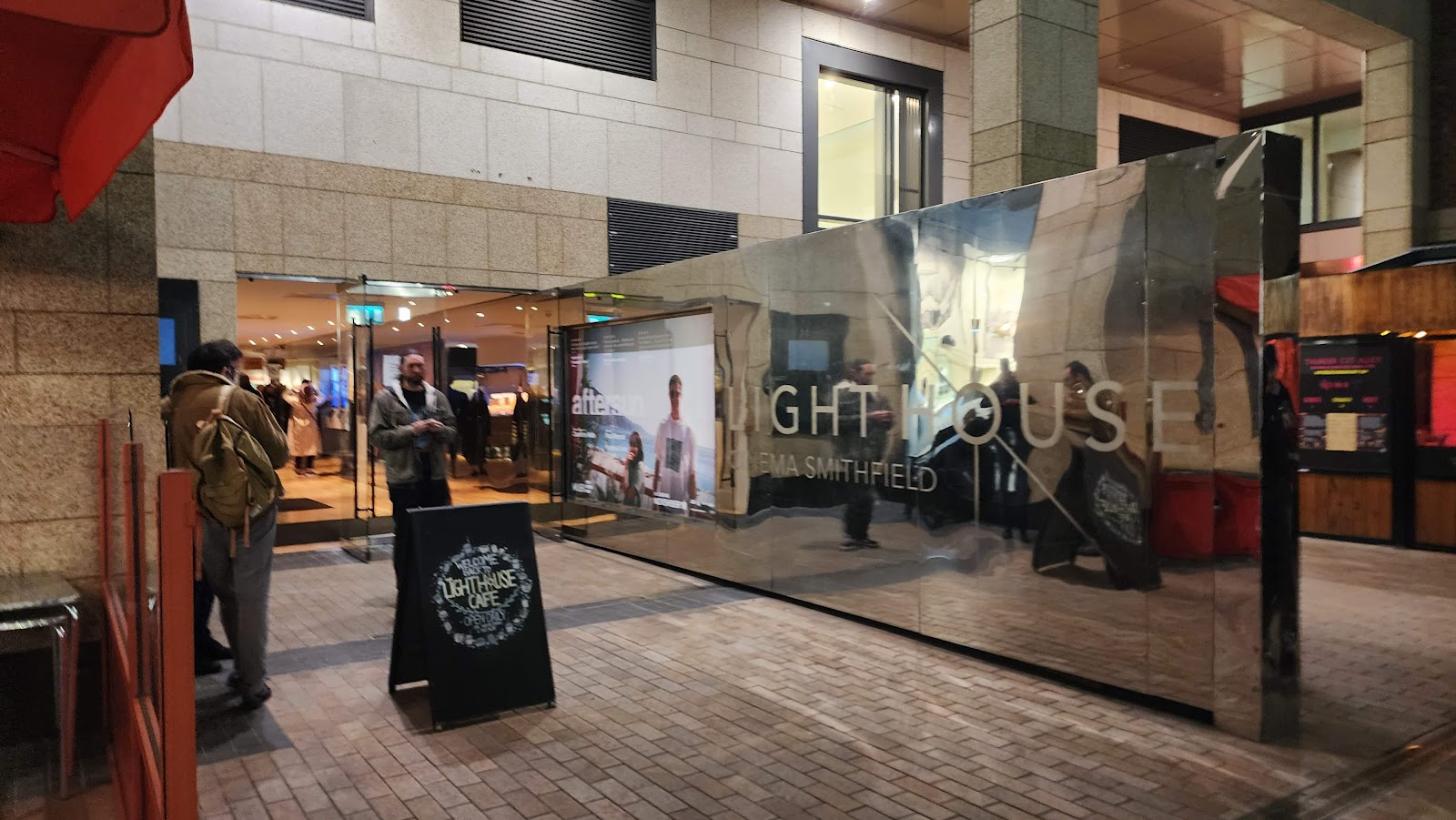Both are apparently leaving Boston after Thursday (and those are early/late shows), though The Lychee Road had a pretty good three-week run; I was kind of worried I might have to find a window while in Montreal, where it was playing at the Forum. They're being displaced by another big Chinese movie (Dead to Rights) and some others from elsewhere in Asia - the Shin Godzilla rerelease and War 2 & Coolie from India.
It always amuses me that, when I get back from Fantasia, there are a couple of films that would have been right at home there which I kind of have to scramble to see, but it's mostly because those movies have a higher churn rate than a lot of multiplex material all year round.
My Daughter Is a Zombie
* * ½ (out of four)
Seen 8 August 2025 in AMC Causeway Street #8 (first-run, laser DCP)
Where to stream it (when available)
As far as I can tell, My Daughter Is a Zombie has no connection to My Neighbor Zombie, one of my favorite movies in the genre that also happens to come from South Korea, but I like it for one of the same reasons I liked the other: The filmmakers steadfastly refuse to approve of solving a health-care crisis with guns, which even the most well-intentioned folks in other zombie movies find hard to resist.
The film opens with Lee Jeong-hwan (Jo Jung-suk), a former zookeeper and large animal trainer, returning to his family home in the quaint village of Eunbag-Ri to greet his daughter Su-ah (Choi Yu-ri) - who, we are soon shown and informed, is likely South Korea's last zombie. Like most 15-year-old girls, she found her father kind of cringey and annoying, even if she did share his love of dance, but got bitten while they fled Seoul during the zombie outbreak. She had turned by the time they got to Eunbag-Ri, but neither her father, grandmother Kim Bam-soon (Lee Jung-eun), nor Jeong-hwan's old friend Cho Dong-bae (Yoon Kyung-ho) had it in them to put her down. What they soon discovered was that apparently infectees like Su-ah respond to reminders of their old lives, so they do all they can to help Su-ah resist her new feral instincts. Not eager to help, on the other hand, is Shin Yeon-hwa (Cho Yeo-jeong), Jeong-hwan's first love, the local schoolteacher, and, after having to put down her own finacé, the region's top zombie-hunter.
I don't know how many Webtoon-derived movies I've seen, but this feels like the most Webtoon-derived a movie can be. There's an episodic structure that seems built to never really end but also never leave you completely hanging if it were to stop, a cat that is just expressive enough to need to be CGI. That isn't a dig, necessarily, but it kind of feels 90% premise, 10% plot, committed to the idea of this but kind of content to meander and not worrying about filling in some gaps. It's all right by that, though; the filmmakers capture how comics designed for infinite scroll have a sort of soothing rhythm even when the events are tense, and translate transitions and style to live action well. I'm reasonably sure the caricaturist at an amusement park is the original artist, which would be cute.
It's got a pleasant enough cast playing characters you're seldom sorry to see on screen, too: The adults are affable and funny while still tending to carry a little bit of the tension that naturally comes with hiding Su-ah, with Cho Jung-seok tending to look more committed as the movie goes on and more backstory is revealed, while Lee Jung-eun gives depth to the alcoholic granny that would typically be a comic character and Cho Yeo-jeong sees how a potential threat can be funny. I like Choi Yu-ri's Su-ah enough to wish we saw most of her as just a regular kid, although I kind of suspect that the pantomime she does as a zombie is kind of difficult to pull off well. The script says the word "zombie" throughout but doesn't treat Romero rules as necessarily definitive (indeed, the entire idea is arguably that they're made to force people to act cruelly rather than question cruelty). The filmmakers are pretty good at balancing cute absurdity and danger.
Maybe not enough; there's a lot that seems really ill-advised beyond what we might be willing to forgive, and less soul searching afterward than seems warranted. The story maps just well enough onto caring for, say, a child with cognitive issues that the places where it doesn't feel a bit uncomfortable (I wonder how it would hit if the girl's father was "teaching" instead of "training" her). And, boy, it wants to have all the endings, both introducing a new threat and including a gigantic "oh, by the way" bit.
Is it a bit odd for a zombie movie to ultimately be described as "pleasant"? Maybe, and there are certainly times when it doesn't seem to be the best of ideas, but it's not a bad idea to take this approach every once in a while.
Chang'an De Li Zhi (The Lychee Road)
* * ¾ (out of four)
Seen 9 August 2025 in AMC Causeway Street #9 (first-run, laser DCP)
Where to stream it (when available)
The trick of a movie like The Lychee Road, I think, is figuring out how to maintain the odd spirit of the start, where you've got room to be kind of goofy setting things up and making jokes that are either anachronistic or about how certain things haven't changed to make the Tang Dynasty relatable to a moder audience, into the finale, when the stakes are immediate, the story is maybe catching up to recorded history, and there's a lesson you want to teach. Da Peng is better at the modern and chaotic than period adventure and dreams, so this movie slides out of his wheelhouse as that goes on.
He plays Li Shande, who came to the capital at 24 with the desire to be a dedicated public servant, and twenty-odd years later "Old Li" is well-liked by his co-workers in the Department of Imperial Granaries but still a broke ninth-level administrator (he's much better at math than politics), taking out an expensive loan to buy a home on the very outskirts for his sharp-tempered wife A-tong (Zhuang Dafei) and young daughter (Yang Huanyu). But it gets worse: The Emperor has decreed that fresh lychees from Lingnan will be served at his wife's birthday celebration on June 1st, 117 days away, but lychees spoil in three or four days, far faster than any route between the cities. Scheming Eunuch Du Shaoling (Zhang Ruoyun) advises the head of the Granaries, Liu Shuling (Wang Xun), to find a sap to appoint as Lychee envoy and take the fall, along with the expected death sentence for failing the Emperor. That'd be Old Li. It takes him 30 days to reach Lingnan and would likely take just as long to return. Ambitious merchant Su Liang (Bai "White-K" Ke), a second son looking to escape his brother's shadow, offers to buy the pass that will let Li bypass tolls and customs to live out the next three months in comfort, but after meeting Su and Zheng Yuting (Yang Mi), the young owner of the local orchards, he begins to think there may be a way to pull it off.
Longtime fans of co-writer/director/star Dong "Da Peng" Chengpeng, whose movies have fairly reliably opened in North America on top of being big hits in China, should feel at home in the first section; Li is more nerd than hustler, but he's both pretty funny and a guy audiences can relate to amid the slapstick chaos and broad comedy, a lot of it along the lines of "folks in Tang Dynasty Chang'an had to pay mortgages and deal with monstrous bosses too!", and even in this sort of period piece, it's the sort of comedy Da Peng is good at, both as a filmmaker and an actor. There's delights in the middle, too, as Li sets out to handle a mission where he's been set up to fail by using the scientific method and experimenting with logistics, along with making friends with the people he'll need to help rather than ring to trick them. It's a neat balance of problem-solving and not getting too far into the weeds, and sort of feels like a bridge between the light satire of the first act and a finale which needs to be believable in Tang Dynasty terms. There's lots of chuckling about pigeons being Imperial email and wondering if stickers were really a thing in that time.
Even before the finale throws a bunch of epilogues one's way, though, the shift to something more melodramatic feels a bit off, especially if one thinks Li Shinde would be more conscious of where his new plan was heading. The scheming suddenly seems too immediate compared to the rest of the movie, and too abstract. Sure, the truth of the matter is that Li's fate is largely in the hands of nobles and bureaucrats who barely regard him as human while he's in the room with them, and not even that once he leaves, but even with the occasional cuts back to Chang'an, it's hard to get invested in the scheming over who will lose face if Li succeeds (and is willing to kill over it) versus those who think they can derive advantage when the sort of logistics problems Li has to solve on the fly are what has been driving interest so far. There's also a speech which seems a little too intent on reflecting good socialist values, maybe to counter how Su Liang and Zheng Yuting aren't portrayed in a bad light for being businesspeople seeking advantages, but we've all got folks who need to hear it, whether we're in China or the United States.
It is, at least, an extremely watchable cast that Da Peng surrounds himself with: Zhuang Dafei gets introduced as something of a harpy who mostly slaps people, but by the end one can see a marriage that works. White-K and Yang Mi lubricate the center of the movie in different ways and always feel like they've got a life outside this particular story. When you need to raise the stakes in the end, you can do a lot worse than bringing in Andy Lau Tak-wah as an imperial advisor who seems malevolent even when being helpful.
I'm not sure it necessarily adds up to a crowd pleaser, though it's done fairly well in its native land and stuck around here longer than usual. There are bits throughout the movie to enjoy, at least, even if it as a whole never gets the heights of the filmmaker's best, zaniest work.







